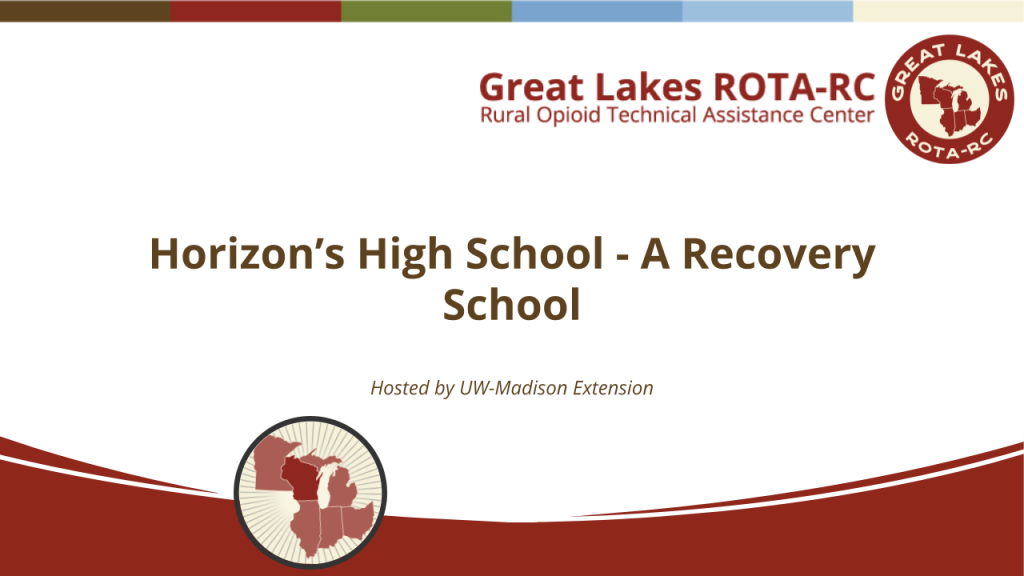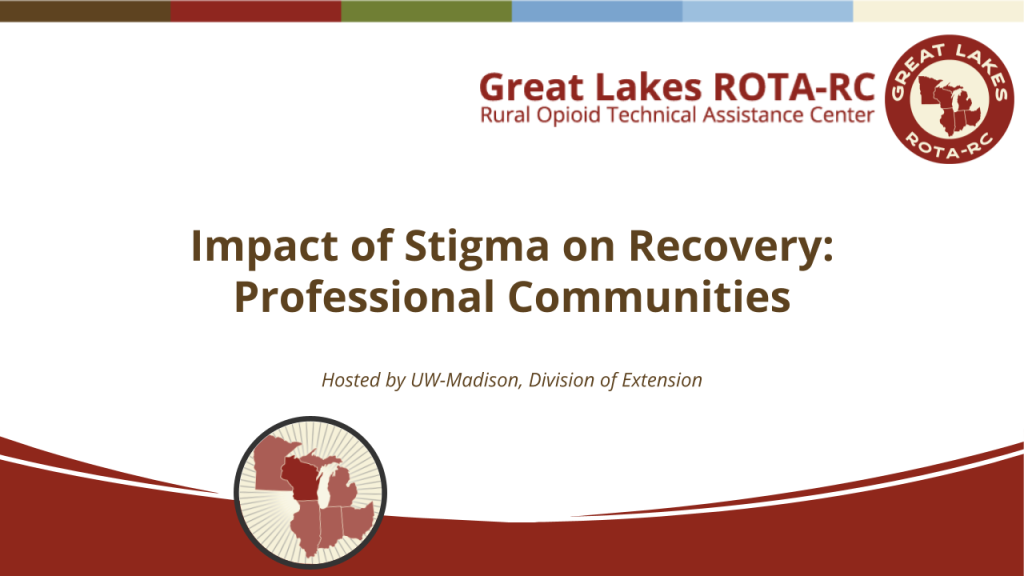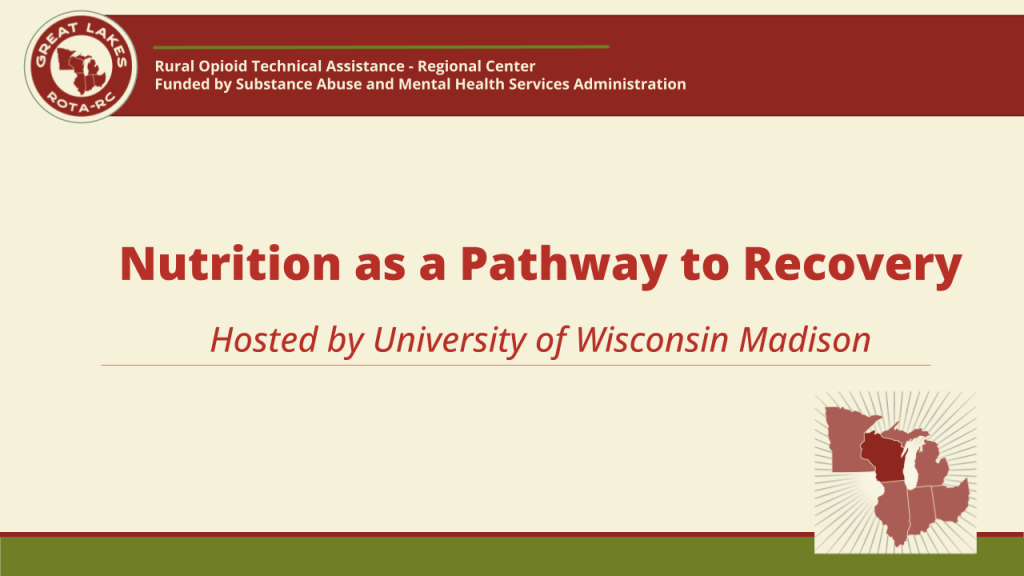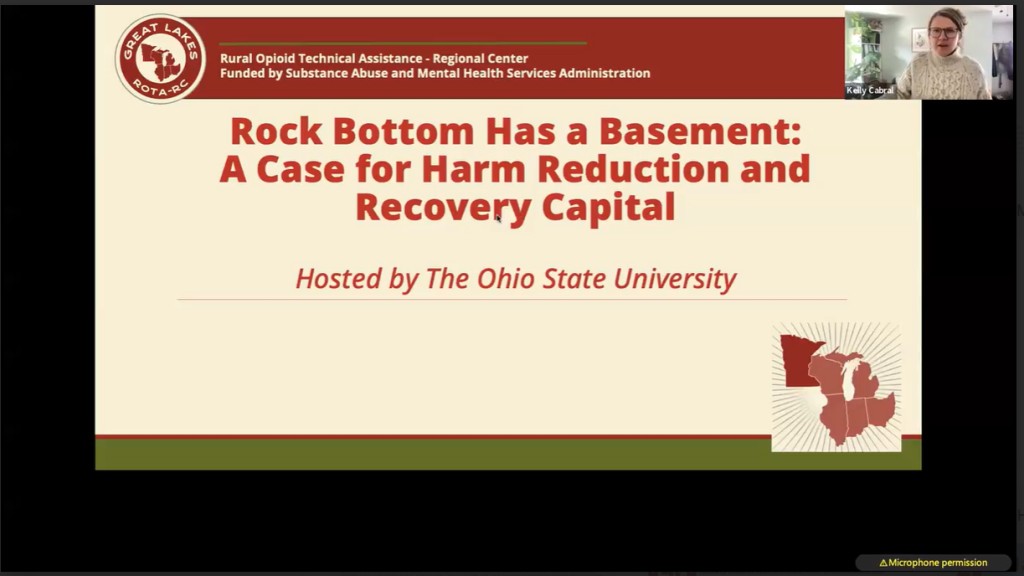Recovery-Based Education

ROTA-RC PAST EVENTS
Event Recordings & Resources
Building informed, supportive communities is key to reducing stigma and improving outcomes for individuals affected by substance use and mental health challenges.
Table of Contents
Grief Through Different Lenses: Survivors and Communities
During this session participants will identify the main social and structural contexts of drug overdose death bereavement and learn about the real world impacts of a Minnesota school-based program called Growing Through Grief.
- Demonstrate an understanding of research on interrupted mourning and complex grief reactions in relation to drug overdose death.
- Learn about proactive programming to address underserved public health needs through Growing Through Grief and apply statistics related to prevalence and cause of childhood bereavement in their work setting
- Apply knowledge on research to explore interventions to better support individuals, families, and communities experiencing overdose death bereavement.
Resources
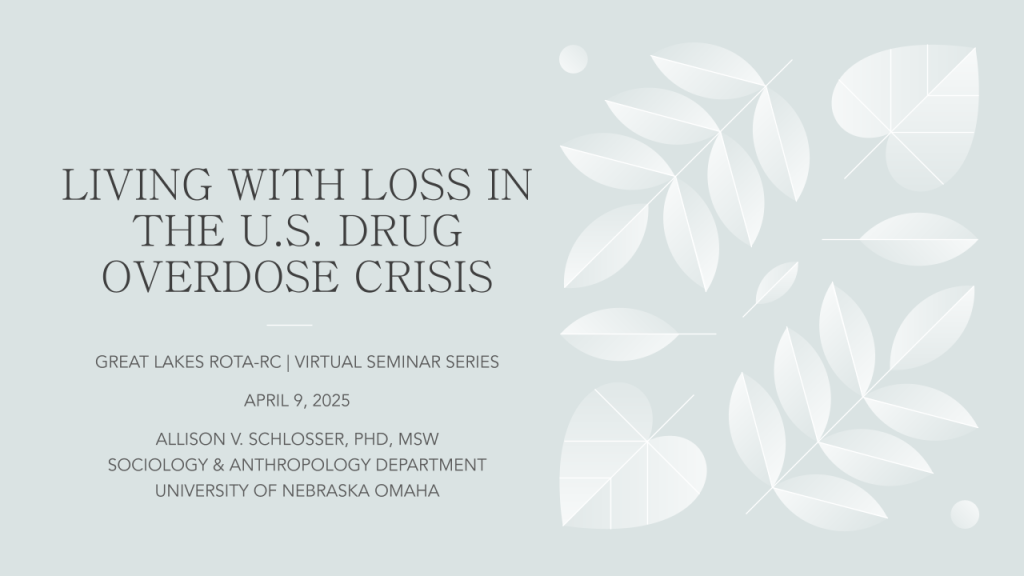
Published: Wednesday, April 9, 2025
Attendance/ Credit Information
Horizons High School: A Recovery School
Horizon High School is a traditional high school that offers support for students recovering from substance abuse. It was founded in 2004 by Dane County residents who wanted to provide a safe place for teens to go to school after treatment. The school has had several locations, including 5003 University Avenue, which was flooded in 2014.
Horizon High School supports students academically, mentally, and emotionally. It offers group therapy, life skills, and summer school.
Resources
Impact of Stigma on Recovery in Professional Communities
Stigma surrounding drugs and the people who use them is ubiquitous, but it isn’t always recognized or understood. Research shows that substance use-related stigma is high among the general public, among treatment professionals, and even among people who use drugs themselves. The burden of stigma is a particular challenge for former, current, or aspiring professionals who face additional barriers related to hiring, promotion, and social engagement. In this session, we explore the impact of stigma on professional communities as well as evidence-based strategies to reduce it.
Resources
Recovery Friendly Workplaces
Every day, individuals with substance use disorders and in recovery face challenges to maintain health and well-being. Community connections, including access to stable jobs, steady paychecks, and supportive workplaces help sustain recovery. Recovery Friendly Workplaces is an initiative for local employers to better understand policies and practices that can help make a work environment supportive. RFW offers evidence-based information for employers who want to make foundational changes to the way they hire, engage with, and support employees living with or seeking recovery from substance abuse.
Resources
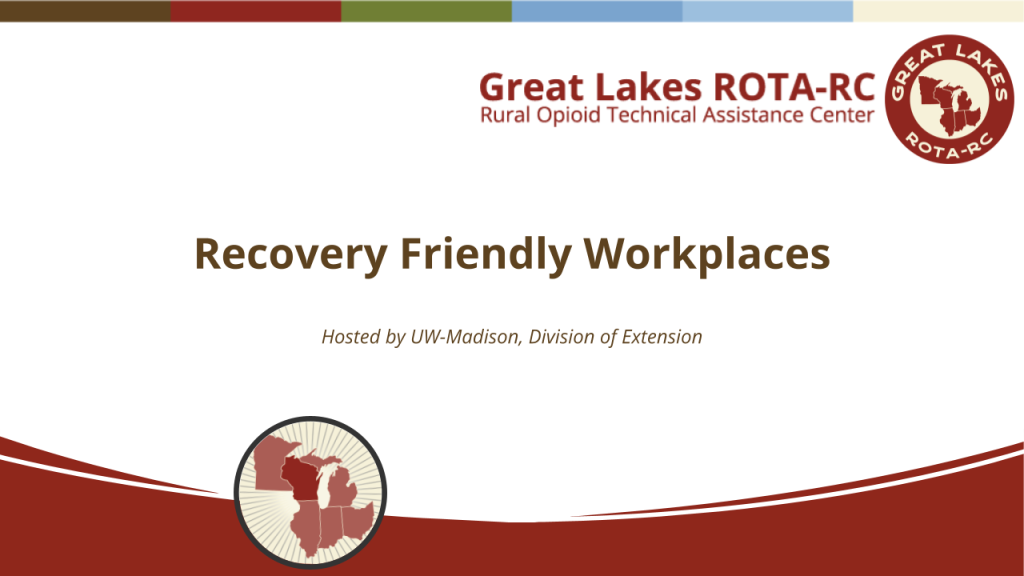
Published: Wednesday, January 22, 2025
Attendance/ Credit Information
Changing Families, Changing Outcomes: Compassionate Responses to Substance Use in the Family
3-Part Series
From Tough Love, to Loving Well
An overview of why families matter, and some simple things that we can do immediately to help families respond with intention through this process.
Resources
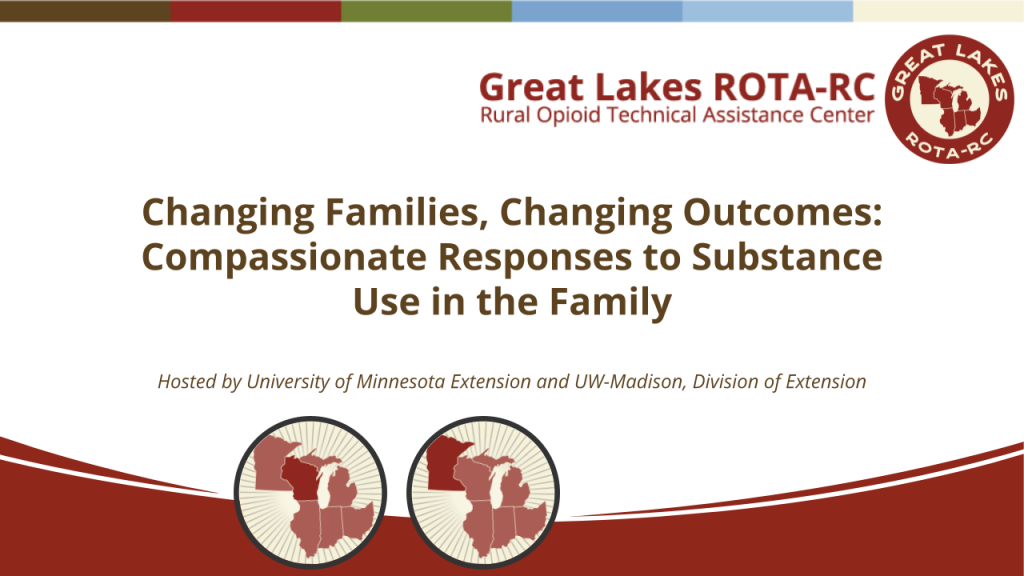
Published: Tuesdays, July 9, 16, 23, 2024
Attendance/ Credit Information
Working with Pregnant and Parenting People Who Use Drugs
In this session we will be discussing addiction within the context of pregnancy and parenting. Discussion will focus on evidence-based treatments for substance use disorders for pregnant and parenting people who use drugs.
Learning objectives from participation in the session
- Upon completion, participants will understand the definition of addiction.
- Upon completion, participants will have a better understanding of evidence-based treatments for addiction.
Resources
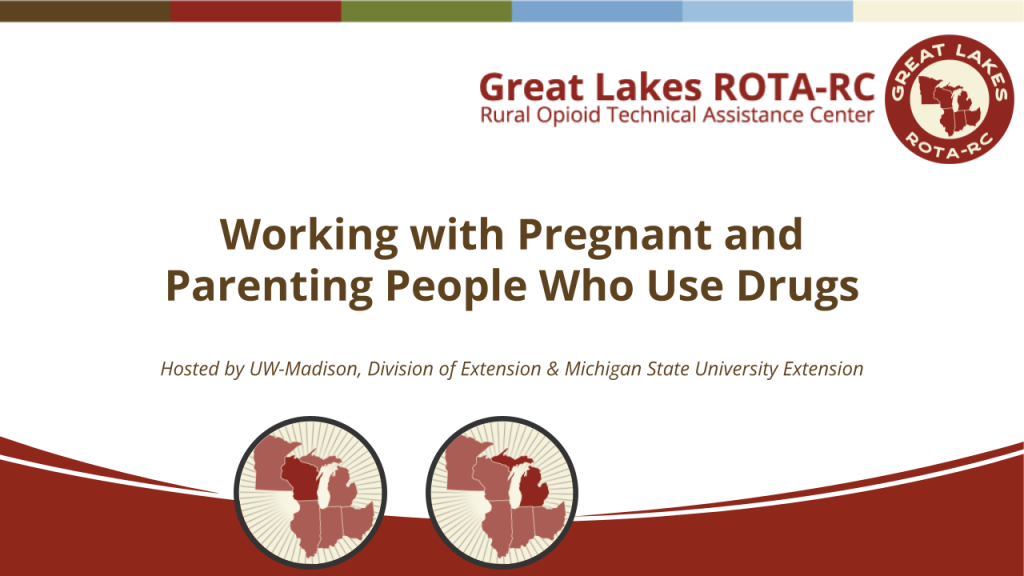
Published: Wednesday, July 10, 2024
Attendance/ Credit Information
Reimagining Recovery
This webinar series explores the structural and root determinants of health, limitations of the brain disease model of addiction, and how criminalizing and punitive approaches to substance use are both normalized and exacerbating the overdose crisis. Presenters will highlight regional trends in opioid use, emphasize non-punitive strategies to support people who use drugs and/or are living in recovery and describe ways that communities can better support people who use drugs and their families.
Resources
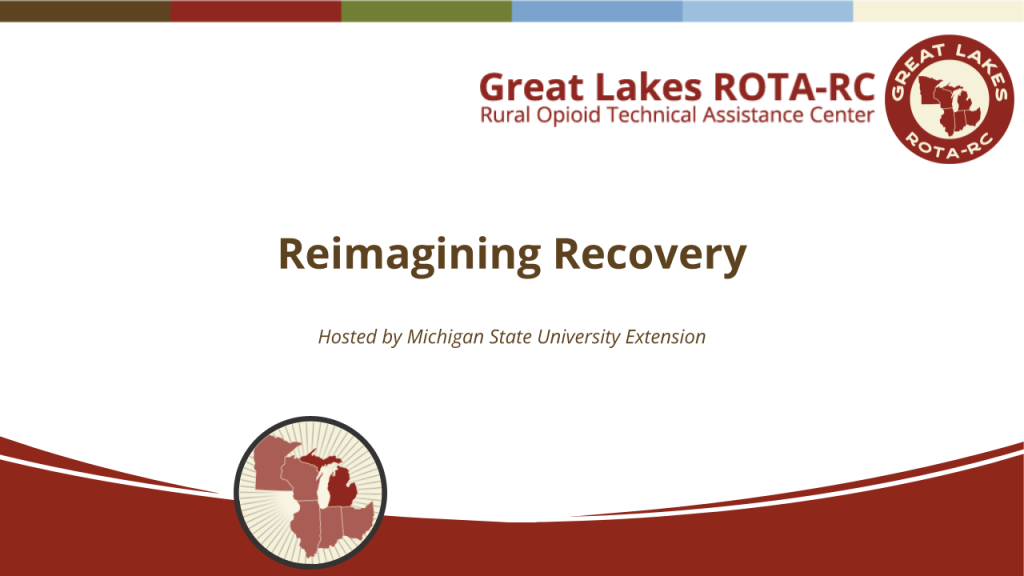
Published: Thursdays, June 6,13, 20, 2024
Attendance/ Credit Information
Event Folio
Research on Psychedelic Compounds in the Treatment of Substance Use Disorders
This session will review some of the theoretical underpinnings of the therapeutic potential of psychedelic compounds with a focus on psilocybin as a treatment for substance use disorders. The state of the literature and current ongoing research in this space at University of Wisconsin will be discussed.
Learning Objectives
- Discuss challenges to implementation of clinical models for psychedelic medicine administration.
- Discuss the state of the science as it relates to psychedelics as potential treatments for SUDs.
- Describe typical study designs and procedures in psychedelic clinical trials.
Resources
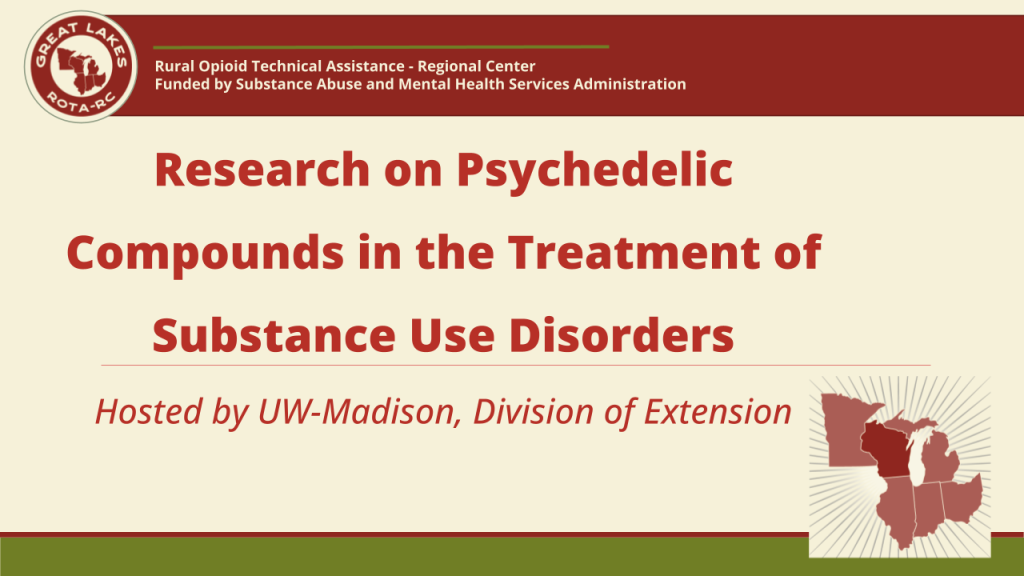
Published: Monday, February 5, 2024
Attendance/ Credit Information
Recovery Oriented Systems of Care
Historically, substance use, and mental health challenges have been treated with an acute care medical model, focusing on stabilization but not the long-term recovery process. In this session, learn about recovery-oriented systems of care or ROSC; what it means, how it is changing the recovery field, and how systems can work to coordinate the broad range of support needed for people seeking multiple pathways to recovery.
Resources
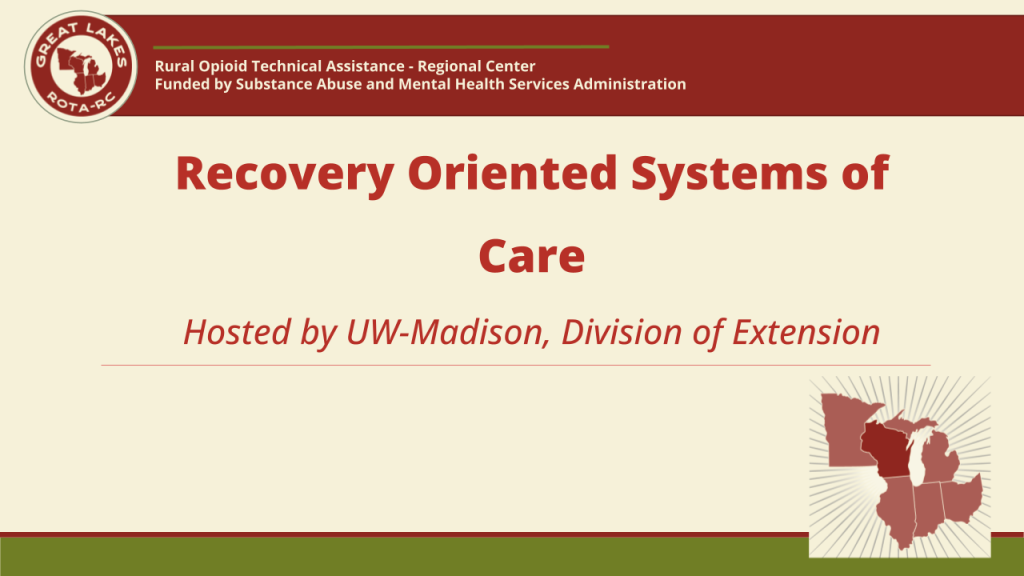
Published: Wednesday, January 31, 2024
Attendance/ Credit Information
Role of Forgiveness In Recovery
Forgiveness Factor exists to promote forgiveness as a way to live mentally well. Tim brings a unique perspective through sharing his personal journey through childhood trauma, alcoholism, betrayals, misunderstandings, mental health challenges, and life. He is a speaker and contributing writer for the International Forgiveness Institute. In July of 2022, Tim was presented with the Healing Hearts Hero Award at the International Agape Love and Forgiveness Conference for “his years of commitment to helping others learn about the virtues of self-forgiveness and interpersonal forgiveness.” He also provides keynotes and workshop for educators and families.
Resources

Published: Wednesday, November 29, 2023
Attendance/ Credit Information
Parent-Child Interaction Therapy in the Context of Recovery
This session will describe Parent-Child Interaction Therapy (PCIT), a dynamic intervention that works directly with parents and their young children to help parents strengthen their bonds and communication with their children. PCIT provides parents with the skills they can use to help enhance their child’s emotional and behavioral regulation. It can even provide them the skills to help them resolve their children’s experience of trauma, including children’s exposure to substance use and other adversities. PCIT has been modified for use in various communities and can be considered for the substance use recovery context.
Resources
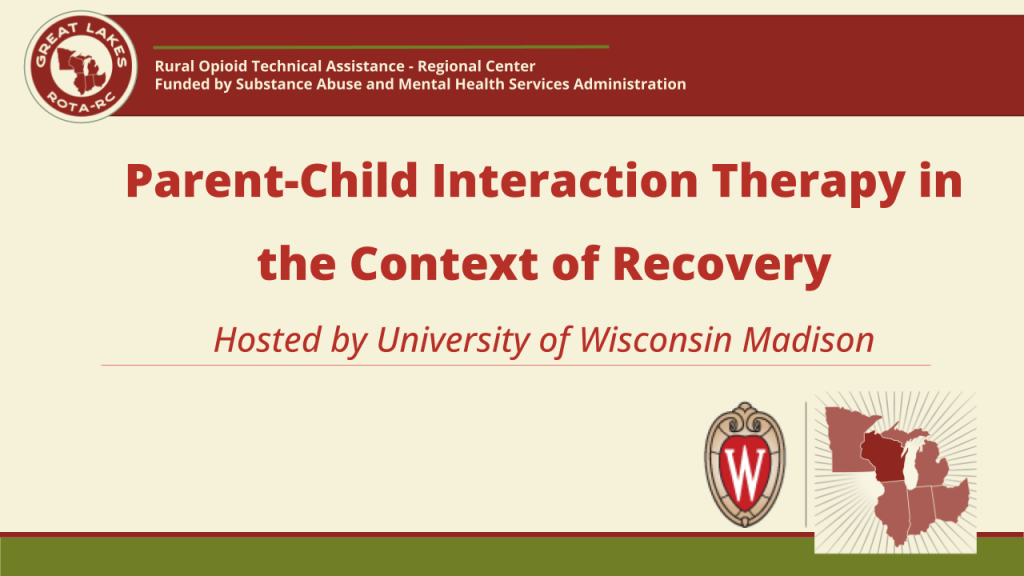
Published: Thursday, August 17, 2023
Attendance/ Credit Information
Nutrition as a Pathway to Recovery
The relationship between nutrition and substance use is complicated. Nutrition can either help or hinder recovery. In fact, food can become an addiction of its own! This workshop aims to provide participants with a comprehensive understanding of the role of nutrition in substance use recovery. More specifically, we identify common nutrition-related challenges faced by those in recovery, explore practical strategies for supporting and improving nutrition, and consider the impact of sustained nutritional wellness on long-term recovery. Eat Good, Feel Good. Feel Good, Do Good!
Resources
How To Be A Recovery Ally
Join the University of Missouri’s Recovery Friendly Workplaces project staff and learn about how to be a recovery ally. Do you or does someone you know identify as in recovery from a substance use disorder (SUD)? Do you or does someone you know live sober or utilize harm reduction strategies to engage with substances in less risky ways? Living in recovery takes many forms. Some people might share with you that they are in recovery, and others may choose to remain anonymous. If you know someone in recovery from a SUD, you might be wondering how you can be a better friend to them or how you might better support them. Being a friend to someone in recovery and supporting their journey is described as a recovery ally. University of Missouri Extension’s Community Health Engagement and Outreach program collaborated with Missouri’s Partners in Prevention to create a training for becoming a recovery ally in the workplace. During this presentation we will discuss SUD, common misperceptions, how to support someone seeking or already in recovery, and how to support employees with SUD in the workplace.
Resources
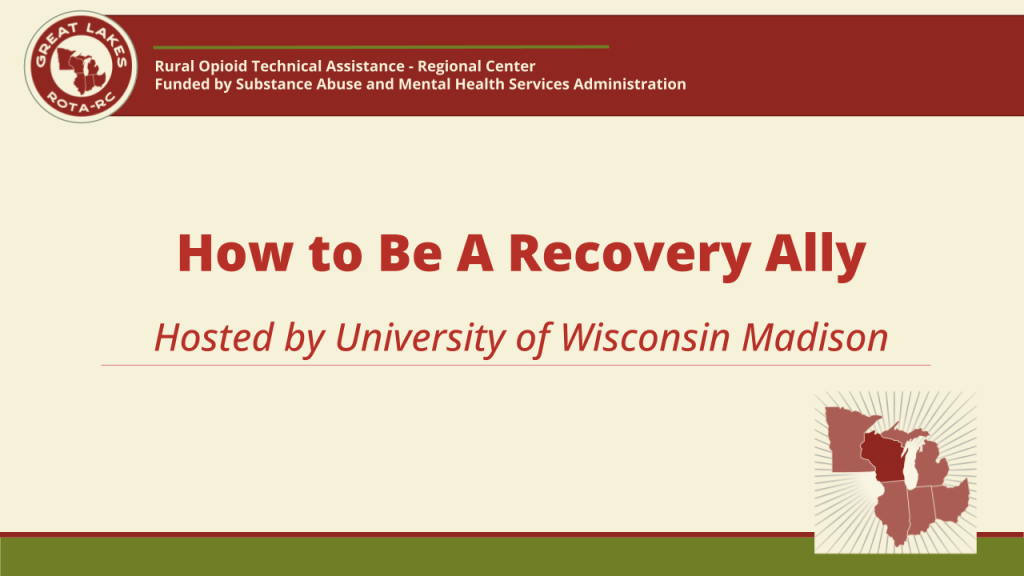
Published: Thursday, April 20, 2023
Attendance/ Credit Information
Event Folio
Rock Bottom Has a Basement: A Case for Harm Reduction and Recovery
The notion that people with a substance use disorder (SUD) need to hit “rock bottom” to recover is harmful during an overdose crisis occurring nationally. In 2021, more than 100,000 Americans died as a result of a preventable drug overdose. Addiction is a chronic, relapsing brain disorder, and recovery is a process, not an event. This 1-hour presentation will make the case for a more humane, sensible, and effective approach to addressing SUD in our communities.


